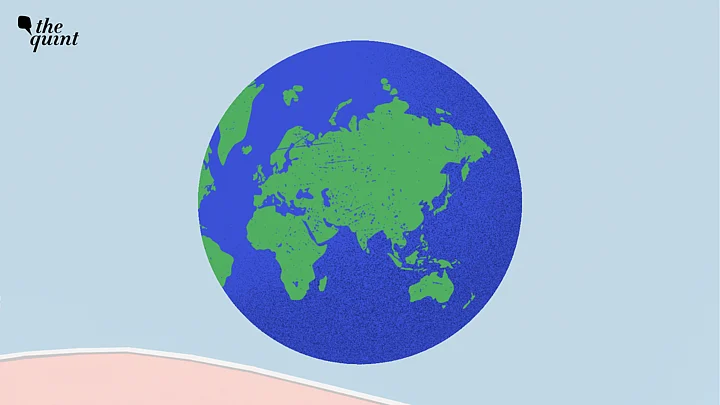Are we prepared for the climate crisis staring us in the face? The Quint wants to go big on telling the most important stories of our time. Support us to tell them. Become a member now.
'By the year 2100, the length of our days will increase to 2.62 milliseconds per century due to climate change' – This is what a new study, titled The Increasingly Dominant Role of Climate Change on Length of Day Variations, published in the PNAS Journal on 15 July, has suggested.
According to the study, since the year 2000, due to climate change, the length of days has risen to 1.33 milliseconds per century.
What does this mean for you? Will the length of the day be increasing by one thousandth of a second impact you in any way? Does a number that small even matter? The Quint asked experts.
‘Climate Change Is a Big Factor’: Big Points From the Study
The major findings of the study suggest:
In the 20th century, the climate change-induced increase in the length of day was between 0.3-1 milliseconds.
The “change in the movement of mass,” along with the earth getting flatter at the poles and increasing at the equator, is a major reason for this.
Professor Somnath Baidya Roy, Head of The Centre of Atmospheric Sciences and The Rockefeller Foundation Chair of Climate Sciences and Technology at IIT Delhi, explains to The Quint that the length of a day depends on how fast the earth is spinning. If it’s spinning slower, days will be longer.
What’s been happening, he adds, is that with global warming, ice caps and glaciers are melting, and the sea level is rising. Due to this, the height of the poles is changing too.
He says, “The earth started out as a sphere, because of rotation it became oval, and now because of ice caps melting, it’s becoming flatter. As it gets flatter, the earth’s rotation is slowing down, and the days are becoming longer.”
However, Professor Roy points out that our major concern at the moment should be that climate change is contributing to this event.
“Till now we only thought that astronomical forces or the solar system had an impact on the length of days and the spinning of earth, but now it’s suddenly come to light that humans can also impact it. The climate crisis is reaching a point where what we used to think of as “eternal truth” or a fundamental fact of the universe is now being affected by human activity.”Professor Somnath Baidya Roy
'No Reason To Panic… Yet'
While it is concerning, there’s not enough reason to worry just yet, experts tell The Quint.
Ranjit Gadgil, an environment expert and programme director at Parisar, says,
“The change in length of day is very small and the effect of climate change, as per the study, though significant as a percentage (they say it might double), is still very small in absolute terms. We are talking about a thousandth of a second (millisecond) in a century!”
Professor Roy agrees. He explains that if the length of days increases significantly, say by an hour, there would be more daylight, varied temperatures, a lot more energy in the atmosphere, increased convection in clouds, and storms would become more frequent.
“But right now, it’ll take us thousands of years to reach that point. You won’t see any impact on biological species yet,” he says.
However, one thing that will need to change with the current variation is the settings for atomic clocks – which measures daylight to the milliseconds – based on which the algorithms for GPS devices, satellite signals, tracking systems for flights, rockets, and missiles, etc, would have to change for precision-based systems.
‘We Still Need More Empirical Evidence’
So, what does all this mean for us now?
Will the variation in the length of the days impact agriculture or farming, or possibly lead to food insecurity? Will the increased energy in the atmosphere and longer days mean that people’s health is impacted?
The short answer is we don’t know yet.
Abinash Mohanty, Sector Head, Climate Change & Sustainability at IPE Global, and Expert Reviewer of IPCC- AR(6), tells The Quint that while this study is fascinating in itself, we still need more research to be conducted to see how a phenomenon like this impacts our ecosystems.
“There is need for empirical evidence to see how climate change and the length of days is impacting summer and winter solstice – how it’ll impact changing seasons. What also needs to be studied more in depth is how this will affect the day and night cycle of certain geographies.”Abinash Mohanty
He suggests that this is an anomaly, and we will require individual and intergovernmental efforts to adapt to the situation.
Mohanty tells The Quint, “This variation might also cause a larger number of extreme events. By default, the night temperatures are lower and the day temperatures are higher, but this phenomenon will affect the land-surface temperature. Once that balance is disturbed, you will have aggravated extreme weather events."
However, he does add that just the evidence of the length of day increasing doesn’t show that the temperature is also increasing, so we need more empirical and meteorological studies conducted on that.
(At The Quint, we question everything. Play an active role in shaping our journalism by becoming a member today.)
